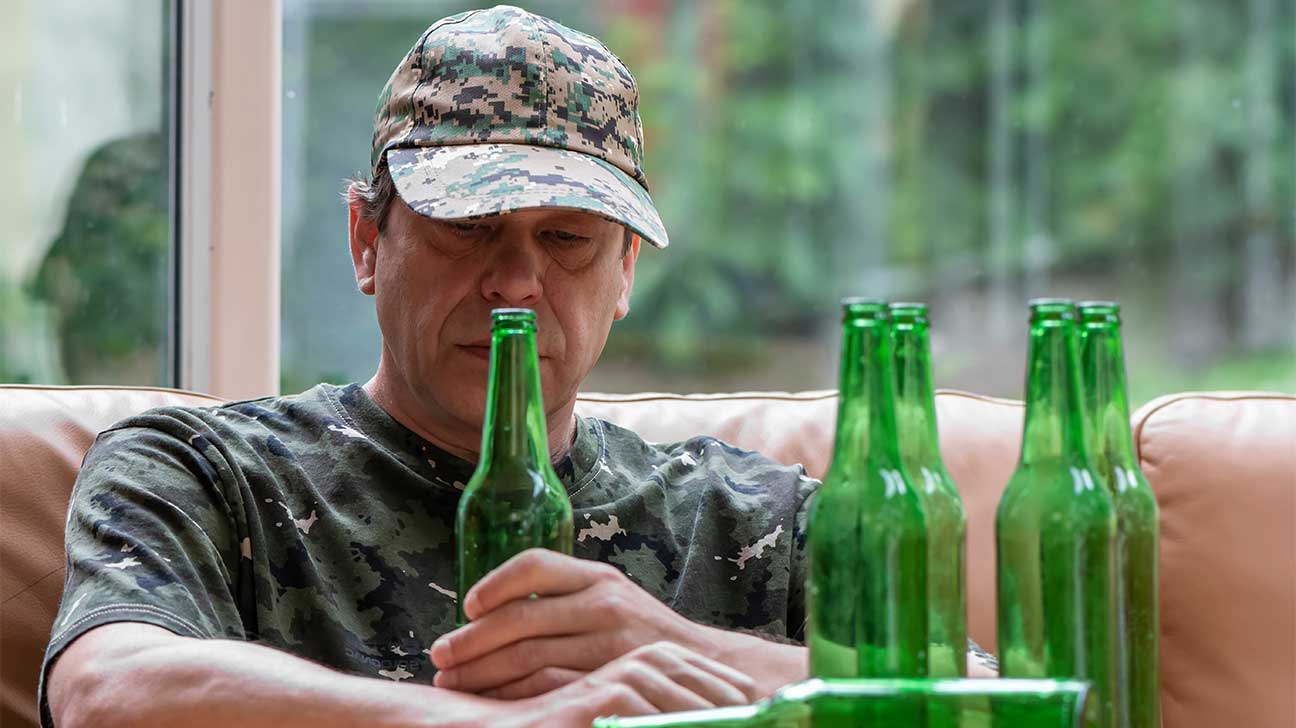
Upon returning home from active-duty service, military personnel face a number of drastic changes. Civilian life is far different from military life, and the transition can be overwhelming.
Roughly 10% of military service veterans abuse drugs and/or alcohol. Many of these vets may do so to self-medicate from stressors, including trauma.
Veterans with addiction issues are more likely to have co-occurring disorders like post-traumatic stress disorder (PTSD). The risk of substance abuse increases with compounding mental health disorders.
Learn more about other careers with high rates of addiction
Rates Of Substance Abuse Among Military Veterans
Approximately one in 10 military veterans are diagnosed with a substance use disorder (SUD). Alcohol is the substance of choice for the majority (65%) of veterans who enter treatment.
Many vets with alcohol use disorder (AUD) start binge drinking during active service. About 8.3% of vets experience alcohol abuse; a rate that’s nearly double that of the general population (4.5%).
The prevalence of AUD amongst veterans jumps to 10% for those who served in Afghanistan and/or Iraq.
Illicit And Prescription Drug Use
A lower percentage of veterans abuse drugs, with marijuana as the most-used illicit drug (15.2%). Between 2002 and 2009, cannabis use disorder among veterans more than doubled.
After marijuana, the most-used illicit drug among veterans are methamphetamines (1.3%), cocaine (1.2%), and hallucinogens (1.2%).
Nearly half of all service members experience at least one injury each year. Some are prescribed opioid painkillers to deal with chronic pain.
People who use opioids for pain management are more likely to develop opioid use disorder. Veterans are twice as likely to die from an accidental opioid overdose than civilians.
| Type Of Drug Use | Rate Of Addiction | Trend |
|---|---|---|
| Alcohol Use | 8.3% | Slightly increasing |
| Illicit Drug Use | 15.2% marijuana use | Increasing |
| Prescription Drug Abuse | 3.3% | Increasing in recent years |
Signs Of Addiction In Veterans
Military veterans who are experiencing a drug or alcohol addiction may exhibit telltale physical or psychological warning signs.
Common signs of a substance use disorder (SUD) include:
- bloodshot or glossy eyes
- pupils that are oversized or pinhole-sized
- shakes or tremors
- slurring
- unpredictable mood swings, e.g., depression, anxiety, irritability, and/or paranoia
- decreased concern for personal appearance and hygiene
- sudden weight loss or gain
- memory lapses or blackouts
- unexplained injuries
- sudden need for financial help, e.g., asking loved ones to borrow money
Risk Factors For Addiction Among Veterans
There may be several reasons why the veteran population is more prone to substance abuse. Some of the main risk factors center on transitioning to civilian life, mental health problems, and trauma.
Transition To Civilian Life
When veterans return home from active duty service, they must acclimate back to civilian life. For veterans who have experienced combat, this is often particularly difficult.
Active duty military members adhere to rigid schedules. Upon returning home, veterans may experience a combination of boredom, anxiety, and confusion concerning their newly freed-up schedule.
Some veterans struggle with reintegrating into family life. A veteran’s return requires the spouse, children, and other household members to simultaneously adjust to new roles and expectations.
Mental Health Issues
About 30% of military veterans have at least one mental health condition. Many vets suffer from anxiety and/or depression or PTSD, a mental disorder prompted by exposure to traumatic events.
About 7% of all veterans are diagnosed with PTSD. PTSD had a direct correlation with substance abuse, and more than 20% of veterans with PTSD also have an SUD.
People with PTSD, including veterans, may use substances to self-medicate from trauma. Substance abuse only permits the cycle of PTSD to perpetuate and worsen.
Veterans who aren’t diagnosed with a mental illness may also experience intense waves of emotion. Guilt, anger, and sadness are common, especially for veterans who faced combat exposure.
Traumatic Brain Injury (TBI)
Traumatic brain injury (TBI) is associated with an increased risk of substance abuse. Between 2000 and 2021, more than 450,000 active duty service members were diagnosed with a TBI.
TBI increases the likelihood of having depression and/or anxiety. Depending on the severity, TBI can pose a long-term challenge in all areas of life.
Difficulty Finding Employment
The transition between military and civilian life may also entail employment troubles. Unfortunately, there are stereotypes about veterans that may perpetuate these troubles.
Some employers feel that veterans are rigid and thus challenging to train, while others may be concerned about anger management.
Employers may look past the fact that service makes military veterans desirable employees who are just as dedicated and capable as other employees, or even more so in some cases.
Career support is available to veterans through the U.S. Department of Veterans Affairs, but some veterans face the trouble of accessing these and other resources.
Housing Insecurity
Nearly 13% of military veterans live below the poverty line. The number of veterans who are houseless accounts for 11% of the entire houseless population in the U.S.
Contributors of the high rate of veteran houselessness include:
- unemployment
- mental illness
- substance abuse
- health conditions
- poverty
- lack of affordable housing
- lack of family support
Supporting Military Veterans With Addiction Issues
Veterans with substance use issues face a difficult hurdle, but addiction treatment and support is available, and recovery is possible.
The U.S. Department of Veteran Affairs (VA) offers SUD treatment services for veterans. Veterans may be considered for disability benefits if an addiction affects their mental or physical health.
Some of the treatment options offered through the VA include:
- health care
- mental health treatment
- medically assisted detox and medication-assisted treatment (MAT)
- medications to reduce drug or alcohol cravings
- intensive outpatient treatment
- continuing care and relapse prevention
- programs for veterans with specific concerns, such as combat and homeless veterans
There are detox, inpatient, and outpatient treatment programs nationwide that cater to military veterans. There are also support groups, such as Alcoholics Anonymous, that focus on peer-based recovery.
Get Help For Substance Abuse Today
Dealing with an addiction can feel impossible at times, but treatment is available to those who need it. Contact DetoxRehabs.net to find a treatment center today.
Article Sources- Military OneSource – Understanding And Identifying Substance Use Disorders
https://www.militaryonesource.mil/health-wellness/substance-abuse-addiction/understanding-and-identifying-substance-use-disorders/ - National Institute On Drug Abuse (NIDA) – Substance Use And Military Life DrugFacts
https://nida.nih.gov/publications/drugfacts/substance-use-military-life - Substance Abuse And Mental Health Services Administration (SAMHSA) – 2020 National Survey On Drug Use And Health: Veteran Adults
https://www.samhsa.gov/data/sites/default/files/reports/rpt37926/2020NSDUHVeteransSlides072222.pdf - U.S. Department Of Veterans Affairs – PTSD And Substance Abuse In Veterans
https://www.ptsd.va.gov/understand/related/substance_abuse_vet.asp - U.S. Department of Veterans Affairs – Traumatic Brain Injury (TBI)
https://www.research.va.gov/topics/tbi.cfm


